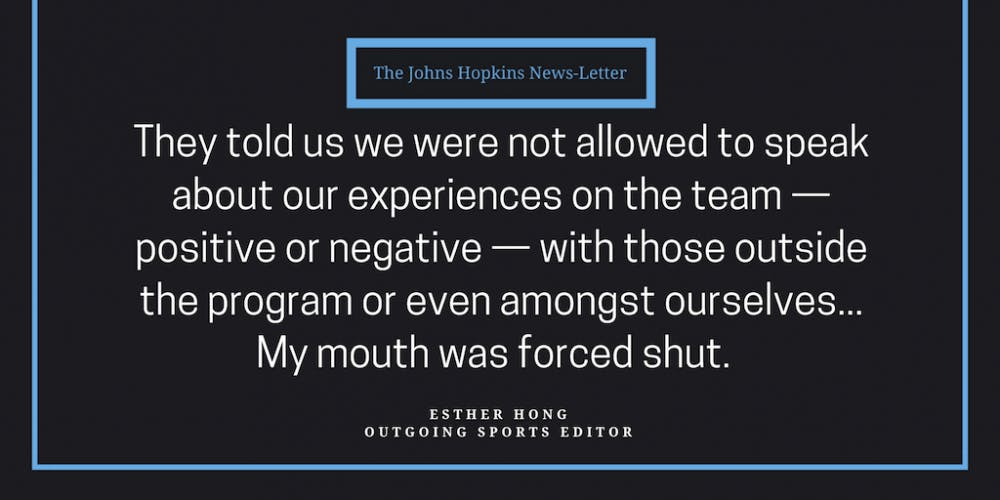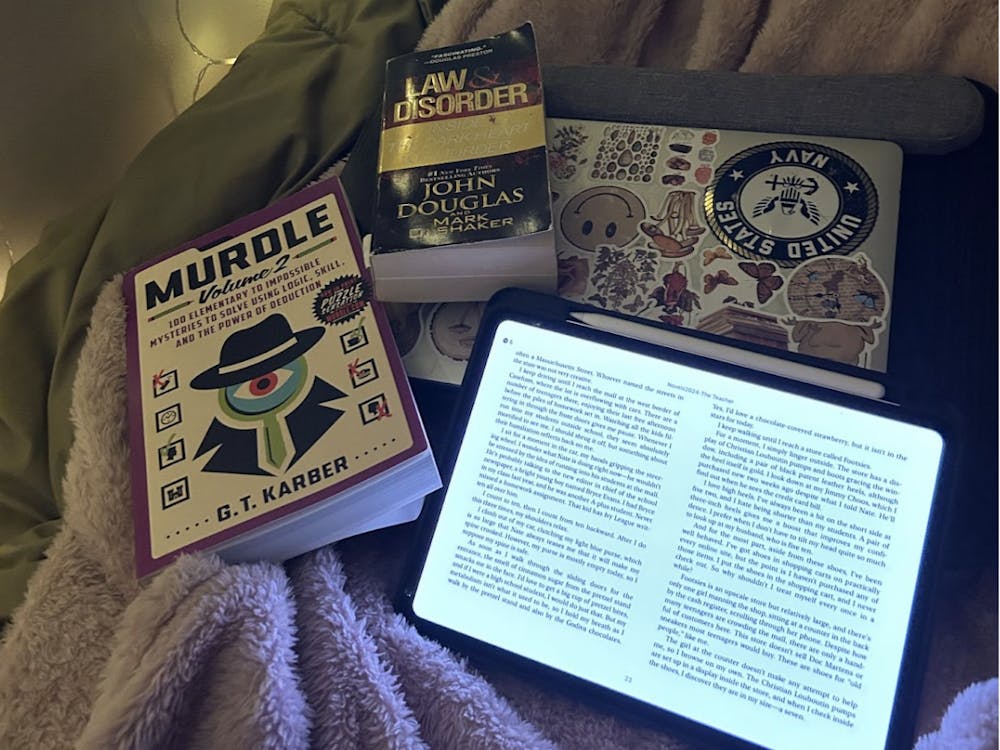
A lot — to say the least — has happened since August 10, 2018. And ever since, I’ve wanted to speak up. Every week I’ve told myself, “This is the week I’m going to publish my reflection.” And every week, I cowered. I was afraid people would use my words against me, and I have no doubt that they still will.
The one week I finally mustered the courage to tell a few of my peers about my reflection, I was shamed for even thinking about writing it. I, the volleyball player who isn’t afraid to dive into bleachers, run into walls and jump over tables to keep the ball from dropping, was overcome by fear.
So what makes this week any different? Nothing too thrilling, really. There was no life-changing incident, no moment of epiphany. Instead, it was a long-fought battle of rediscovering my fire.
It’s taken many anxious nights of violently waking up from nightmares in tears or out of breath, but now I can say that I am finally ready. Let’s talk about how the Hopkins Athletic Department silenced me.
I share my experiences not to complain, but to hold the Athletic Department accountable.
I share my experiences not to ask for sympathy, but to ensure that no current or future Blue Jay is subjected to the senior season I had. I share my experiences not to stoop down, but to rise above.
This isn’t about getting even. This isn’t about disproving any rumors going around. This isn’t about defending my former coach Tim Cole.
This is about sharing my narrative — something that no one can strip away from me.
Strike One: The Investigation:
On Aug. 10, 2018, the volleyball team received an email announcing Tim’s administrative leave. Four days later, the Athletic Department called in a team meeting to address the situation.
The meeting didn’t clarify any concerns I had, as the Athletic Department administrators failed to adequately answer my questions. Instead, they demanded that we not “recollect memories with other people” in order to preserve the integrity of what was to become a full-fledged investigation.
They told us we were not allowed to speak about our experiences on the team — positive or negative — with those outside the program or even amongst ourselves. We weren’t allowed to talk about the early mornings in the gym that made me tougher. We weren’t allowed to talk about post-rally celebrations that filled me up with joy. I was not allowed to “recollect” any of them. My mouth was forced shut.
Worse, however, was what happened next.
Rumors started circulating, but I tried my best to shut out the noise. It wasn’t worth my time, and we had a National Championship to win. Over time, though, I realized that my words were losing gravity.
My voice was being muted. I spent years being subjected to the label of “the quiet Asian girl,” years trying to break out of suffocating stereotypes, years telling myself my words have worth, years forcing myself to be comfortable hearing my own voice.
The effort I put into becoming a strong young woman unafraid of speaking up and speaking out — the accomplishment I hold onto with the most self-love and pride — was uncontrollably slipping through my fingers. And it wasn’t because I grew any less fearless.
It was because to many others my voice was assumed to be tainted with bias. I stopped being able to stand up for my self-worth or my personal narrative because to them, my voice was no longer worthy of being given a chance.
Still, I understood that I had no other choice but to adhere to the Athletic Department’s protocol because any false step, they said, would impact the investigation.
What I didn’t understand was why some people, especially those who held no position in the team, were allowed to slide by the rules when my every move was being monitored by administrators.
Why did administrators turn a blind eye when these people “recollected” their memories but gave me a slap on the wrist for doing the same?
I am not by any means against people speaking up. The power of speech is not just empowering, but necessary. We need voices to be heard and conflicts to be had, but not when the conversation is controlled through selective silencing.
When I voiced this concern to the administration, they responded by saying there was nothing they could do.
Strike Two: The NCAA Compliance Meeting
On Dec. 3, 2018, another team meeting was called, this time to inform us that we were violating the “new interpretation” of the NCAA Division III rules by calling out-of-season practices “captain’s practices” instead of “voluntary workouts” and having recovery yoga sessions on the weekends. Just another slap on the wrist by administrators, what’s new? Although frustrating, this wasn’t the glaring issue. At the end of the meeting, we were asked if we had any general questions or concerns. My classmate, Sasha Gorelik, confidently raised her hand and proceeded to recount an incident, one that immediately brought me disgust.
After the season ended in December, when we were allowed to contact Tim for the first time since mid-August, a group of us decided to catch up with him. It was the least we could do for our coach, let alone our friend. Soon after, Sasha heard that Athletic Department staff members were outwardly ridiculing us for contacting our former coach. Working adults employed by this University were shaming us as 18-to-21-year-old women for making a decision that affected no one but ourselves.
Why do staff members have the power to judge whether my actions outside the Athletic Department are right or wrong? Why do staff members have the power to make belittling statements about me? And how is this acceptable? How is this the “work culture” that has been fostered throughout the Athletic Department?
Sasha said it best, “Staff engaging in trash talking the team is childish, disgusting and unacceptable. I don’t know how this is being overlooked and allowed. I am being demonized from every direction.”
One of the administrators responded, “That’s unfortunate.”
The Athletic Department creates an illusion of listening to athletes by meeting with team captains and asking team members to fill out end-of-season surveys. However, little is ever done to address our concerns. This façade persists because frankly, it looks bad to exclude our voices. It looks bad to make decisions or end conversations without extending the opportunity for our feedback to seem as if it is being heard.
It’s unacceptable that employees are shaming us. It’s even more unacceptable that when we speak up, all we get are two meaningless words: “That’s unfortunate.”
Strike Three: TBD
For the baseball enthusiast or amateur baseball fan, like myself, you know that three strikes means you’re out. The Athletic Department is currently two strikes in, and I write this to stop it from swinging at the third and final strike. No more selective silencing, no more façade of consideration, and most importantly, no more devaluing our voices.
Am I going to face retaliation for writing this? No doubt — life isn’t fair, and it’s definitely not easy. But at least I get to go to bed knowing that my pent-up thoughts are no longer hanging over me. And despite the tearful breakdowns and recurring nightmares, I am still eternally grateful. Grateful for the three untouched, blissful years of the Hopkins volleyball I fell in love with. Grateful for the fourth year of adversity that gave me a new layer of resilience. Grateful for the people — you know who you are — who stood tall beside me. Grateful for the opportunity to find my voice all over again.
And to those who are also being silenced by not just the Athletic Department but by any other subjugating institution, I hope my narrative can serve as an extra drop of fuel to encourage you to speak up because in the end, only you can control how you feel and what you do. Whether or not my reflection instigates change within the Athletic Department, we must all rise above victimhood and run into the fire head-on. That’s what makes us champions.





